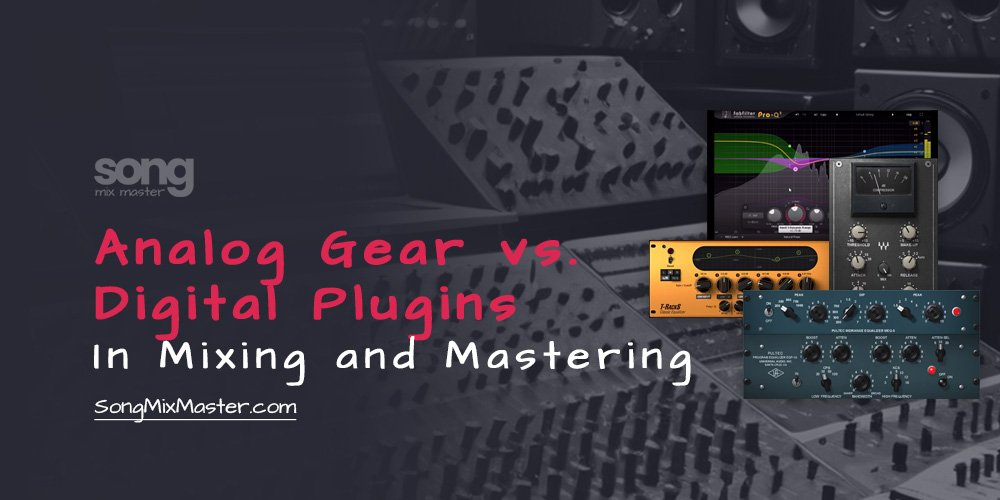Audio Plugins, Mixing
Analog Gear vs. Digital Audio Plugins in Mixing and Mastering
With technology advancing rapidly, the lines between digital precision and analog warmth are blurring, creating a new landscape for artists and producers to navigate. This article explores the contrasting and complementary aspects of both analog gear and digital plug-ins and audio software, emphasizing how modern producers can best leverage these tools in mixing and mastering.
The Appeal of Analog Gear
Analog hardware, such as compressors, equalizers, and mixing consoles, has long been cherished for its warmth, character, and tactile interaction. These units process audio through physical components like tubes, capacitors, and transistors, which can add pleasing harmonic distortions, subtle compression, and a sense of depth that is often described as “warmth.”
This warmth is primarily due to analog gear’s ability to enhance or round off certain sound frequencies, creating a richer audio experience.
Analog devices are not just tools but instruments that can be as integral to the sound of a record as a guitar or piano. Their unpredictability and non-linear responses can often lead to happy sonic accidents, adding unique character to a mix that digital systems can sometimes struggle to replicate.
The Versatility of Digital Plugins
Digital plugins, on the other hand, offer precision, repeatability, and a vast range of options that are impossible in the analog domain. Digital audio workstations (DAWs) and plugins can emulate classic gear and also offer entirely new ways of processing sound that are not possible with analog technology. These tools are also significantly more accessible and cost-effective than their hardware counterparts.
Digital plugins excel in surgical precision—such as fixing problematic frequencies, sharp transient shaping, or applying dynamic range control with pinpoint accuracy. They are also indispensable in today’s music production for their ability to save settings, automate parameters smoothly, and handle complex routing effortlessly.
The Hybrid Approach in Modern Music Production
While purists on both sides of the analog-digital divide make compelling arguments, many of today’s most successful music producers employ a hybrid approach, taking advantage of the strengths of both analog and digital realms. This approach allows for the tactile, warm character of analog gear during the tracking and summing stages, combined with the flexibility and recall capabilities of digital plugins during mixing and mastering.
Also see: Best Mastering VST Plugins
Integration and Workflow
Integrating analog hardware into a digital workflow can be achieved through hardware inserts or dedicated conversion equipment that ensures high-fidelity signal transfer between the digital and analog domains. This setup allows producers to use analog equipment for its sonic characteristics on specific tracks or busses, while still maintaining the overall project within a DAW for flexibility and convenience.
Practical Considerations
Cost and Space – Analog equipment is often expensive and requires physical space and maintenance. In contrast, digital plugins are relatively inexpensive and do not require physical space, making them more accessible to a broader range of artists and producers.
Flexibility and Speed – Digital plugins offer unmatched flexibility when it comes to revisions and collaborative projects. They can be instantly recalled with exact settings, making them ideal for fast-paced production environments and iterative workflows.
Conclusion
The debate between analog and digital is less about which is better and more about how each can be used to serve the music being produced. In modern music production, it’s not about choosing one over the other but about understanding and utilizing the strengths of each to enhance the creative process.
For artists looking to explore the hybrid approach and optimize their sound with professional expertise, Song Mix Master is here to help. We specialize in online mixing and mastering services that capitalize on the best aspects of both analog and digital tools.
Our hybrid setup ensures that we can provide the warmth and character of analog along with the precision and flexibility of digital processing. This balanced approach allows us to deliver finely tuned, high-quality audio productions tailored to the specific needs and preferences of our clients.


Disclaimer: Any references to any brands on this website/webpage, including reference to products, trademarks, brands and companies, are provided for description purposes only. We don't have any association with or endorsement by these brands or companies. Some of the links on our blog may be affiliate links. This means if you click on these links and make a purchase, we may earn a commission at no extra cost to you.
Need Professional Mixing & Mastering?
You may also like to read...
My Buyer’s Guide for Professional Studio Headphones
The t.mix xmix 1202 FXMP USB – Best Budget Analog Mixer
The Power of Dynamic EQ – Advanced EQ Techniques & Tips
Best Stereo Imaging Plugins for Achieving Wider Mixes
Understanding Audio Compression: Types and Techniques
FL Studio Transient Processor: Tips and Best Practices